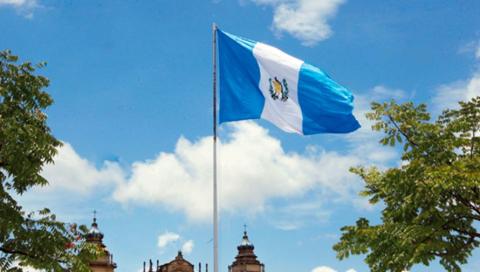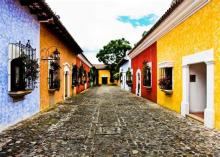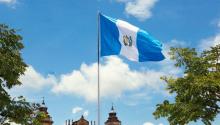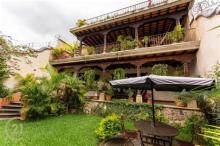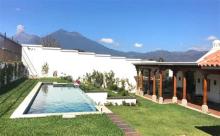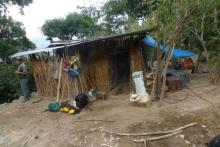Guatemala: Day 6 Waking up at 6:30 am on the beach was much nicer than waking up at 6:30 am pretty much anywhere else, except for the fact that it got COLD during the night. Hurriedly shoving my hair into a ponytail and pulling on clothes that hadn't actually been washed for longer than I cared to remember (I always seemed to be too tired to care about personal hygiene that would be demolished during the day), I stumbled out into the sunlight in search of hot coffee. Having secured that, I was treated to the hospitality that I'd experienced everywhere else on the trip thus far—Fulvio and Graciella brought us our food steaming hot and hovered over us throughout our typical Guatemalan breakfast of eggs, salsa, beans and bread in case we could possibly desire anything else. It made my inner-Dozier/Elmore cringe, since I'm pretty sure I'm NEVER supposed to eat until I've urged the cook to sit down and do likewise, but it was wonderful and clearly expected from us to enjoy our meals heartily. The pounding waves that had lulled me to sleep washed the beach nearby, and I suddenly felt like I wasn't on a work-trip at all. I had instead somehow stumbled into some far richer person's island vacation, and it...was...good.At about 7:30, we piled into the van that basically felt like home and trundled 5 minutes away to “downtown” Monterrico to set up shop in the local doctor's office. Dr. Diego, a man completing his 6-year Guatemalan program with his required 6 months of community service, had kindly lent us his office space for our operations. Oh, and a Guatemalan vet, Dr. Dennys “the Menace,” (as he liked to call himself) had come with us from the bed & breakfast to help out for the 2 days we would be on the coast.As with most of our previous work, this day again felt like a step-up luxury-wise. We again had electricity and running water, and we also had Dr. Diego to lend us things, Dr. Dennys to be awesome, and William (an assistant at the office) to help clean and hold dogs. It was definitely the most hygienic clinic we'd worked in, and the people had far less of that nervous, shifty look about them. Still, as on the other days, I worked hard to keep a warm, confident smile plastered on my face while meeting the eyes of the random Guatemalan citizens, especially if they were looking in at us while we cut into their animals. So, we set up Sep as the intake and recovery station on the front porch, while Danika and I worked hard to prepare animals as quickly as possible for the apparently tireless Drs. Dennys and Kristie. I finally transferred the chore list and surgery diagram from my arm to a piece of paper on the wall, and it appeared to benefit everyone, not just me. Danielle was off surgery (which she definitely preferred) and on to anesthesia, general coordination, and interaction with clients, which is where she thrives. However, when I brought in the first dog to Dr. Dennys' table, I was surprised when asked me if I would assist. Making it clear to him that I had very little experience in this area, I spent about 5 minutes looking like an idiot while struggling into sterile gloves, and then off we went. Thankfully, his English was far better than my Spanish, and he gave me a detailed blow-by-blow account of everything he did. When he was done, I felt a lot smarter and also very relieved that I hadn't had to actually do anything I could screw up. But then, I brought in the next dog, and he motioned that I could assist again. To my surprise, he started having me apply hemostats here and there, cut things, and even at one point stitch closed a section of body wall. I was extremely proud of myself for not panicking, and although I made small mistakes, I never did anything permanently damaging. Dr. Diego, the human doctor, then got into the game by asking to “assist” Kristie in one of her procedures. This was slightly entertaining to me, as Kristie not only knows very little Spanish but also never works with an assistant. Thankfully, Diego knew a lot of English, and to her credit Kristie is an extremely patient and flexible teacher. We even let him do a subcutaneous vaccine injection before everything was done, since he was so fascinated with the correlations between our work and his. Anyways, that first day was delightfully calm—Dr. Dennys was so fast that between the 2 surgeons, we got about the average number of dogs done in ¾ of the time. By about 3:00 pm, we ran out of dogs to do, and were able to close up shop. This was especially delightful in that we could actually leave our equipment in the office overnight. Usually, we had to finish an exhausting day and THEN pack up every little bit and piece before hauling our tired selves home, but this building was secure. After attempting to use the local “internet cafe,” which kicked me off right in the middle of the only e-mail I wanted to send (I did try to keep up communication, Mom! :) ), we drove home in an extremely sweaty, sticky, and dirty state to pull on swimsuits. Danika and I couldn't wait for everyone else to hurry up, so we dashed across the rough black sand beach ourselves and into the ocean. It had been a while since I'd been on a beach, and I'd forgotten just how breath-taking the ocean is. I literally had to stop for a second before going further, just to take it all in. Mountains are impressive, but mountains don't usually visibly move. The ocean is like some huge, living monster, and every rolling wave looks like the smooth back of <em>something</em> coming for me. Despite that, I wasn't afraid. I was definitely too insignificant for the monster to take notice of me, and it would only kill me if I didn't take it seriously. Once everyone else arrived, Dr. Dennys and I were definitely the ones who swam farthest out. For those of you who know my deep and panic-filled fear of dark water, this might be surprising to you. Frankly, I worked very hard at just not thinking about my fear so that I could fully enjoy the moment. And enjoy it I did—the waves were strong enough that I could body surf in towards the shore if I was careful, or be tumbled in along the sand if I wasn't. I got some decent scrapes out of that, because once I lost my footing there wasn't much I could do until it let me go. Bracing myself against the undertow was another thing entirely—my calves burned the next day, just from resisting a wave that was little taller than my ankles. The ocean was STRONG on this section of the pacific coast. Though Dennys and I went out farthest, we still only went out about 30 feet. Any farther would have been quite dangerous. We stayed on the beach long enough to watch the sunset, and it was just another layer of amazing on top of everything else we'd experienced. <img src='http://www.kaiodee.com/sites/default/files/1555365_10202429937686500_1974310034_n.jpg' width=400px />Then we stumbled back to the B&B to wash off sand in the outdoor showers (who knows how many pounds worth) before dumping a similar amount in our personal showers. I have no idea where all that extra sand was hiding. I'm not even sure I WANT to know. Then, we headed out to a local restaurant that was feeding us as part of this vet-support program. They started us off with a traditional drink made from hibiscus called hay-mike-uh (obviously I don't know how to actually spell) that I'm quite fond of, and then fed us a meal I definitely wouldn't be able to afford in the US, which included a stick of what looked like orange spaghetti. Interestingly enough, that's basically what it turned out to be, although apparently it had also been caramelized and fried in oil. It was good, even if it felt like the cook had accidentally spilled raw pasta onto my plate. The only downside of the day was that I felt like I was being EATEN ALIVE by mosquitoes, while nobody else was having a big problem. By the time our waiter brought out some citronella candles, I was miserable. I commandeered one of them to set nearly under my chair, and then proceeded to burn myself on it, but at that point focusing on the burn was far more fun than focusing on my rapidly swelling welts. If I do this again next year, you can bet your ass I'm bringing a ton of bug spray and itch sticks. Guatemalan meals last so long that I eventually took a butter knife to my itches, and let us just be grateful I didn't have anything sharper. Morbid, I know, but when I'm tired, sweaty, and unbelievably itchy, I have no self-control left and basically need a cone of shame for each of my appendages to stop myself from minor self-mutilation. Sleeping was also rough, and I'm not very good at trapping the mosquitoes OUTSIDE of the mosquito netting. Still, the whole thing was just awesome. Random things:--On what I believe was our first day of work, in Santa Marta, a Guatemalan veterinary student named Pamila helped us out. She didn't speak any English, but we both got really good at charades, and she was an absolute sweet heart. Quick note on how the Guatemalan veterinary program works—Pamila was in her 5th year of a 6 year program, but that includes any education we would have called “undergraduate.” The tuition is only about $70 a year, but the students are required to buy lots of things like textbooks and note packets and tools all on their own, as government loans aren't really available. The attrition rate is apparently about 95%, as only those with decent income can finish the program and there are very few, tiny breaks in the difficult curriculum. It is NOTHING as easy as ours, apparently. Way to make me feel like a slacker, Guatemala.--A recurring thing on this trip were verbal quizzes. Danielle wasn't great at talking while performing surgery, but Kristie thrived on it. Danika, being a year farther along in the vet program than I am, was able to answer far more of the questions, but after a while I grew confident to at least take my time to answer. And though it was extremely stressful, the quizzing was one of the most beneficial parts of the trip. I learned A LOT, especially of the things we won't get out of textbooks, and Kristie never failed to explain the logic behind why we did things certain ways. That's definitely my learning style.--I did so many subcutaneous injections on this trip that I actually feel very confident in my technique. Same goes for listening to heart and lung sounds—I became so habituated to the sound of a dog's heartbeat that I heard both a sinus arrhythmia and the reflex bradycardia caused by Dexmedetomidine, although both of these things are normal and I was worried something was wrong. Just getting this repetitive experience was worth the trip. --Hardly any of the dogs had bad drug trips the first day in Monterrico, no idea why. All I can say is it was a welcome relief. Nothing like a screaming dog to up the tension. We did, however, have dogs that freaked out simply from being held by us, and I was given a sharp reminder of being careful with where I put my face. We failed to muzzle one of them, and her attempt to bite me ended up with a long, painful scratch down my cheek. I'm just grateful that this reminder wasn't any more detrimental—a little pain with no scars is definitely one of the most effective ways to relearn a lesson.--Don't know if I've mentioned this before, but many of the dogs we saw had either never been on a leash, never been handled by someone outside of their close, immediate family, and/or had never been inside a building. This went double for the more impoverished communities we visited, and definitely added to the stress of the thing.--Playing Nertz by the ocean is almost as good as playing it at home with my family. Almost.--I used to see heart-warming pictures of people in impoverished situations performing selfless acts for animals and think that that had to be rare. This wasn't a criticism of poor people--I really just figured that if you're busy figuring out how to feed yourself, you can't spend all that much time worrying about anyone else. Survival mode kicks in. However, while in Guatemala I came to find that I was wrong. This love of animals that I have is a widespread thing, transcending all sorts of difficult boundaries. Does everyone care about the animals around them, or see them as something more than just a product to be utilized? No, but there are examples of the exact opposite at every social and economical level.
